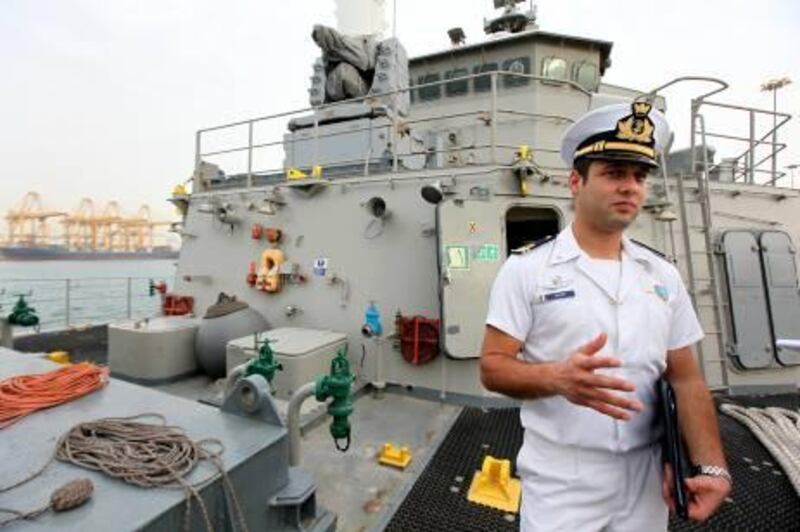DUBAI // Nato mine-hunting ships arrived at Jebel Ali port yesterday for a week-long visit to bolster ties with the UAE.
The visit builds on a co-operation agreement that Nato signed with four Gulf states in 2005, called the Istanbul Convention Initiative (ICI). The partnerships were driven by increasingly shared concerns such as Afghanistan, Iran and the safe transport of oil and gas through the Gulf.
"Minesweeping is absolutely important because [of threats] to close Hormuz in any confrontation … as happened in the Iran-Iraq war," said Mustafa Alani, director of defence and security studies at the Gulf Research Centre.
"One of the things you need is anti-mining capability," he said, adding that it is vital for a navy to "send a message" that if posed with the menace of mines, it "can deal with it".
The Nato force in UAE waters comprises of about 400 crew on five ships - a flagship frigate with a helicopter and four smaller minehunting vessels, all belonging to the Standing Nato Mine Counter-Measures Group 2.
The group's tour of the four ICI nations began in late January with stops at Bahrain and Kuwait, and will finish in early May with Qatar, said spokesman Lt Giampiero Sanna.
While here it will conduct one day of basic exercises with small UAE boats in communication - practising giving directions in code - and maritime manoeuvres.
The two sides will also hold meetings - and play a friendly game of football.
"We are here to interact with the countries of the ICI in order to promote them and foster military co-operation," said Lt Sanna.
The UAE has two minesweepers, which deploy high-frequency sonars to identify suspicious objects under water. Once one is located, either a diver or a remotely operated vehicle (ROV) will swim near it to determine if it is dangerous.
If so, the minesweeper will "neutralise" the mine, often by setting off an explosion nearby.
Their missions are successful 99 per cent of the time, said Lt Sanna.
The visit comes after the UAE deepened its security ties with Nato last month by sending 12 warplanes to help police the Libyan no-fly zone headed by the western military alliance.
For several years the UAE has deployed special forces to Afghanistan to assist the Nato-led effort.
It provides a base or facilities for French, British, American and other nations conducting anti-Taliban operations in Afghanistan and counter-piracy operations in the Arabian Sea.
Emirati forces also participated in the Balkans conflict in the 1990s, and in de-mining work in Lebanon more recently.
During a visit to Abu Dhabi in October 2009 to discuss the ICI, the Nato secretary general Anders Fogh Rasmussen praised the UAE's assistance abroad.
"For many years the United Arab Emirates has shown a strong determination to be a provider of security well beyond the Gulf region … and we look forward to building upon that common effort," he said in a speech.
The Emirati military has in turn acquired Nato expertise and experience, as well as substantial weapons sales, largely from the US and France. The UAE had the world's fourth-highest arms purchases from 2005 to 2009, with US$6.5 billion (Dh22bn), according to the Stockholm International Peace Research Institute, which tracks the industry.
"The current relationship is a good one that works well on both sides,” said Justin Crump, a UK-based security analyst. "Both would probably like slightly deeper ties."






